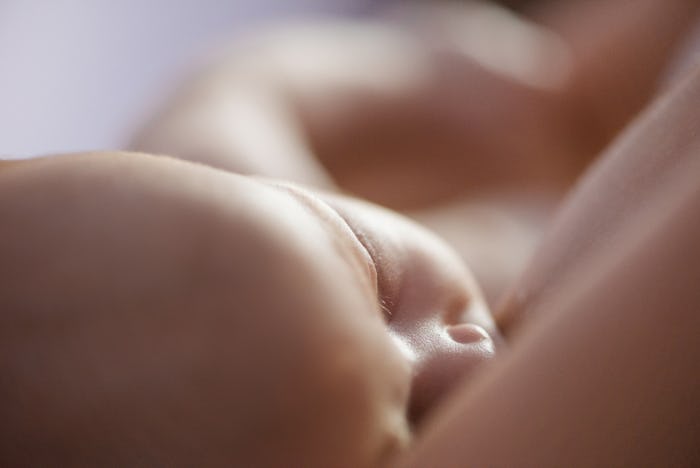Life

Here's What Happens To Your Baby's Brain When You Breastfeed, According To Science
In my experience, breastfeeding is as much a mental activity as it is a physical one. I had all sorts of thoughts swirling inside my head when I was nursing, from the emotionally-charge realization that I was bonding with my baby to mundane ideas about what I was going to make for dinner. So, for me, breastfeeding was both special and boring. It did change me, though, which is why I can't help but think about how it might have changed my baby, too. Turns, out, what happens in a baby's brain when they breastfeed is pretty damn awesome, which just supports my breastfeeding theory even further: something monotonous can still be extraordinary.
A recent study published in the journal Pediatrics, according to Newsweek, found that "children who received more breast milk during their first 28 days of life had more gray matter at various locations within the brain at the age of 7, compared to those who received less." Newsweek went on to discuss exactly what gray matter is, and what that means for a baby-turned-child's brain development:
"Gray matter consists of neurons and it is where cognition and processing within the brain take place. Seven-year-olds who are breastfed more in their first month of life also scored significantly higher on tests of IQ, working memory, math, and motor skills."
A 2010 study published in Pediatric Research also found that "one or more constituents of a mother's breast milk promote brain development at a structural level." The study was administered in response to numerous previous studies reporting that "breastfeeding is associated with higher scores on tests and neurodevelopment and cognition later in life, suggesting that breast milk may impact early brain development, with potentially important biological, medical, and social implications."
The aforementioned study also made a note of pointing out that other findings were questioned because "other factions associated with mothers' choice to breastfeed (e.g. higher socioeconomic status and level of education, different child-rearing attitudes) might promote cognitive development," too. In other words, the previous studies were potentially flawed by design.
In fact, a study highlighted by NPR suggests that although breastfed babies do score higher on cognitive tests in early childhood, the difference is negligible. Study author Lisa-Christine Girard, a child-development researcher at the University College Dublin, explained, saying, "We weren't able to find a direct causal link between breastfeeding and children's cognitive outcomes."
Regardless as to whether or not certain studies take into account other external factors that may impact newborn brain development, numerous studies continue to suggest that breastfeeding promotes healthy cognitive development. For example, Brown University highlighted a study "using brain images from 'quiet' MRI machines," which reportedly "adds to the growing body of evidence that breastfeeding improves brain development in infants." The study went on to explain further, saying:
"Breastfeeding alone produced better brain development than a combination of breastfeeding and formula, which produced better development than formula alone."
But intellect and cognitive development are just part of the story. According to the American Academy of Pediatrics (AAP), breastfeeding helps babies navigate the fourth trimester and get used to life outside the womb. "By holding [your baby] safe in your arms and giving nourishment from your body, you offer [your baby] a sense of continuity fro pre- to post-birth life," the AAP said.
So while there are still a few naysayers — and to be certain, it is important to consider other external factors, like socioeconomic status, when deciphering the cognitive impact nursing has on newborns — the vast majority of studies do suggest that breastfeeding has a positive impact on your baby's brain development. So while you might be suffering from a bad case of "mommy brain," know that your baby's breastfeeding brain is doing just fine.